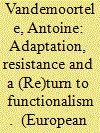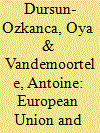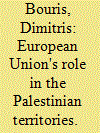|
|
|
Sort Order |
|
|
|
Items / Page
|
|
|
|
|
|
|
| Srl | Item |
| 1 |
ID:
112770


|
|
|
|
|
| Publication |
2012.
|
| Summary/Abstract |
This article analyzes the police restructuring process in Bosnia, and more specifically the role of the European Union in this process, to understand what, and how, different practices, routines and patterns of resistance influenced the timing, direction and outcome of this reform process. It provides a new angle to understand the final outcome of police restructuring by looking at actors' preferences, positions within the field of Security Sector Reform (SSR) and their strategies. The main argument is that a process of 'muddling through' was created by the combination of adaptation and resistance techniques employed by international, European and local actors in the broader police reform dynamics. By empirically demonstrating how and why specific practices of key actors influenced the policy-making process, this article provides a preliminary framework to reassess SSR activities as part of a field of practice, to be analyzed through a sociological lens.
|
|
|
|
|
|
|
|
|
|
|
|
|
|
|
|
| 2 |
ID:
112768


|
|
|
|
|
| Publication |
2012.
|
| Summary/Abstract |
This article provides a theoretically informed analysis to understand why and how security sector reform (SSR) norms have been integrated into the European Union (EU) security architecture. It investigates the role of epistemic communities in advancing the security-development/good governance agenda underpinning SSR and in fostering institutional learning. Shared knowledge and expertise have driven policy and institutional change, since they yielded a new policy consensus that transformed the EU's approach to security in the post-cold war international system. Empirical findings, based on content analysis and on 25+ semi-structured interviews, suggest that transnational expertise-based networks did play a leading role in shaping SSR conceptual development. However, they also show that cleavages between epistemic communities across the security/development dividing line are ultimately responsible for the EU's failure to achieve a coherent SSR policy implementation. Moreover, the article concludes that the institutionalisation of SSR in the EU did not originate in a single norm setter, nor in sheer ideational stimulus. Change occurred through the complex interplay between ideas and interests, that is between knowledge and power, leading specific norms to be visualised as consensual and dominant.
|
|
|
|
|
|
|
|
|
|
|
|
|
|
|
|
| 3 |
ID:
112767


|
|
|
|
|
| Publication |
2012.
|
| Summary/Abstract |
This article presents an introduction to the special volume, titled The European Union (EU) and the Security Sector Reform Practices: Challenges of Implementation, by framing the debate on the EU's Security Sector Reform (SSR) activities in a variety of conflict and post-conflict settings. Drawing on the existing body of literature on SSR, the analytical model proposed here allows us to identify, categorize, and group a wide range of factors that are relevant for understanding the performance of the EU as an SSR actor. This article introduces the main themes of this special issue, summarizes each individual contribution briefly, extends the main research findings of this special issue, and concludes with broad commonalities across different cases. It is a conceptual article outlining a discussion of wider theoretical reflections based on the empirical contributions presented in this volume, and provides an explanatory framework for success or failure in the individual case studies that follow.
|
|
|
|
|
|
|
|
|
|
|
|
|
|
|
|
| 4 |
ID:
112773


|
|
|
|
|
| Publication |
2012.
|
| Summary/Abstract |
The aim of this article is to shed light on the distinctive role of the EU in Security Sector Reform (SSR) in the case of the Occupied Palestinian Territories (OPTs) and examine how SSR has contributed to the overall state-building project. Following the Oslo Accords, the EU engaged actively in the state-building project in the OPTs taking a number of initiatives on the ground. Since then security has been a key issue in all Israeli-Palestinian agreements and has also became synonymous with Palestinian statehood. The article draws upon literature on state-building and SSR and its central aim is to examine the distinctive initiatives that the EU has taken in order to help the Palestinian Authority (PA) reform both its security and judiciary sector as part of its broader state-building strategy towards the OPTs, as well as provide explanations on why these policies had limited impact.
|
|
|
|
|
|
|
|
|
|
|
|
|
|
|
|
| 5 |
ID:
112769


|
|
|
|
|
| Publication |
2012.
|
| Summary/Abstract |
Since the 9 of the 11 events, the US and the European Union (EU) have been involved in Afghanistan in order to fight the Taliban and reinstitute Afghan authority and legitimacy domestically and internationally. This article looks at the case study of the EU Police mission in Afghanistan - EUPOL-A - launched in 2007. The Police Reform implemented by EUPOL, modeled on previous police missions, is based on the Security Sector Reform (SSR), which focuses on improving the rule of law by strengthening two sectors: police and judiciary. Afghanistan is a unique case study as it is the first Common Security and Defence Policy (CSDP) mission launched in time of war and illustrates divergent strategic opinions within the Euro-Atlantic community. This article suggests that the outcomes in Afghanistan have considerable implications on the future of the CSDP in civilian missions and the credibility of the EU as a civilian power.
|
|
|
|
|
|
|
|
|
|
|
|
|
|
|
|
| 6 |
ID:
112771


|
|
|
|
|
| Publication |
2012.
|
| Summary/Abstract |
This article addresses the way in which the European Union engages in the implementation of security sector reform in the Democratic Republic of Congo. Adopting a governance perspective complemented with resource-dependency theory, the analysis concentrates on the multitude of public and private actors involved, the relations between these actors and the impact this has on the implementation of SSR policies in the DRC. Five key variables are analysed: (1) the interplay between inadequate formal procedures and the useful informal coordination practices on the ground in Congo, (2) the variable availability of resources and the interdependencies among the actors, (3) the diverging interests to engage in the Congolese SSR, (4) the different SSR approaches and (5) the variable and sensitive relations with the Congolese authorities.
|
|
|
|
|
|
|
|
|
|
|
|
|
|
|
|
| 7 |
ID:
112774


|
|
|
|
|
| Publication |
2012.
|
| Summary/Abstract |
Security Sector Reform (SSR) holds different meanings and hence varying implications for recipients and donors. Therefore, as an initial point of departure it is necessary to offer a more precise understanding of what can the European Union (EU) offer as a donor to recipient nations in need of SSR? The empirical case of Georgia presents an interesting and challenging case for SSR. There have been a number of domestic and international conflicts in the post-Soviet era, which has left a volatile legacy. There needs to be a cautious and long-term approach that balances what Georgia needs and wants with what the EU can offer. Rather than a narrow approach to the SSR programme, a broader and more encompassing assistance needs to be undertaken in order to affect a more stable and sustainable change. This process shall require talking and offering, but also listening to what Georgian officials request and desire.
|
|
|
|
|
|
|
|
|
|
|
|
|
|
|
|
| 8 |
ID:
112772


|
|
|
|
|
| Publication |
2012.
|
| Summary/Abstract |
Security Sector Reform (SSR) is critical in post-conflict settings, particularly when it comes to the reform of judicial systems, intelligence services, police, correctional systems, and the military. This article traces and analyzes the inter-institutional division of labor between the European Union (EU), the Organization for Security and Cooperation in Europe (OSCE) Mission in Kosovo, and the United Nations Interim Administration Mission in Kosovo (UNMIK) concerning police reform process in Kosovo. After providing an overview of the evolution of cooperation on SSR between the EU and these other international organizations in Kosovo, the article outlines the complex division of labor among various international organizations in establishing the police force, discusses the process of recruiting minorities into the force, and analyzes the general process of reforming Kosovo's police force. Following a discussion of the obstacles and challenges associated with building and reforming the police, it concludes with a summary of key findings.
|
|
|
|
|
|
|
|
|
|
|
|
|
|
|
|
| 9 |
ID:
112775


|
|
|
|
|
| Publication |
2012.
|
| Summary/Abstract |
This article focuses on the use of informal justice systems to support Community Based Policing with the aim to create legitimacy between state and society in post-conflict processes. It analyses the EU's involvement in reviving the customary justice system adat in Aceh, Indonesia in order to discern how the concept of authority is mediated from an international organisation to local stakeholders via Security Sector Reform (SSR). The article operates with three conceptions of authority present in situations of security sector assistance: modern, postmodern and traditional. It explores the different faces of authority present in the case of Aceh, and unravels which and whose authority the EU propagates through its support to SSR. The article finds potentially contradictory processes at work, and highlights the need for more research on the use of informal justice systems within SSR.
|
|
|
|
|
|
|
|
|
|
|
|
|
|
|
|
|
|
|
|
|